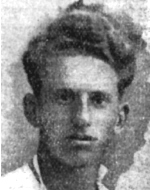Son of Mina and Yosef, was born on the 23rd of Iyar, June 2, 1929, in Haifa. When he was ten years old, he joined Hanoar Haoved. Since then, he had distributed all his time to study, to movement, to training, and to preparing for defense positions. When he was fourteen years old, he finished elementary school with honors, receiving a scholarship. He then entered the vocational high school of the Technion, in Haifa. He was a member of the “Hanoar Haoved” secretariat, in Kiryat Haim. Yonatan joined Gadna. At the age of fifteen, he was a Hagam instructor. When he was sixteen, he completed a course for Gadna commanders. At seventeen, he was one of the founders of the “Hanoar Haoved” youth movement, at Beit Hashita. Before leaving for training, he was a regional commander of the Gadna, in the Krayot, and after graduating from the vocational high school, he joined the Palmach and went to Beit Hashita. He served in the “Yiftach” Brigade and participated in the battles of Mishmar Ha’emek, Kfar Zarin, Gilboa, Operation Mataat in the Galilee, Malkiya, and Latrun, From the beginning of his service, until the day of his fall, he served as the secretary of the hachshara. He was a tall, solemn, responsible and proud man. As a youth counselor, and in his serious performance, or in singing and dancing, he managed to control all difficult situations. He left many diaries, lists and articles in his estate. In training, and to take control of soldiers of various exiles, a mixture of languages, prejudices, traditions and customs of different communities; To overcome the difficulties involved in introducing a member of the training into a framework of military discipline; To find the middle ground in the relationship between the private and the commander, both members of the training. The job was difficult, and he succeeded. When the question of the release of the only sons came up, he wrote: “No one son should be preferred to a son who is a sister to him, every soldier is needed now, and every soldier is the only son of the nation, to bring victory.” Jonathan fell on the 28th of Elul, October 2, 1948, in the Battle of the Khirbet-Mihaz outpost, east of Ruhama, when he stood in a group of sixteen people, against enemy attack. He was laid to rest in the cemetery in Mishmar Hanegev. About two weeks after his death, an armored vehicle, with a two-pound cannon, was named after him, which was taken from the Egyptians to mark his heroism.
